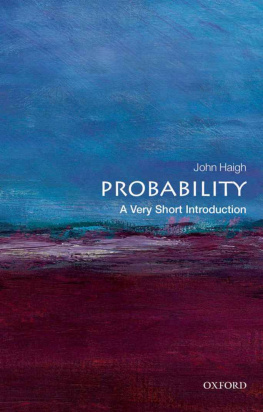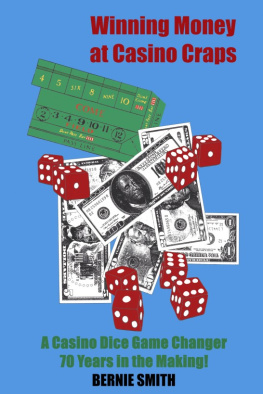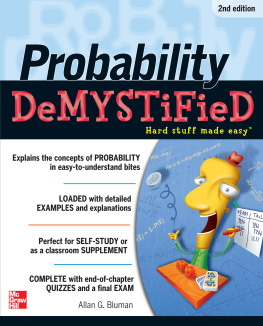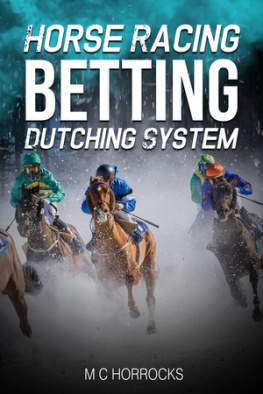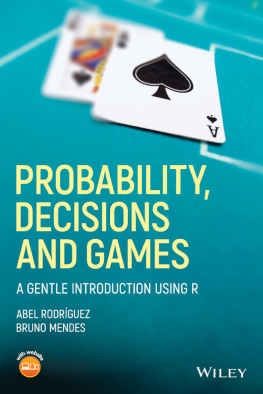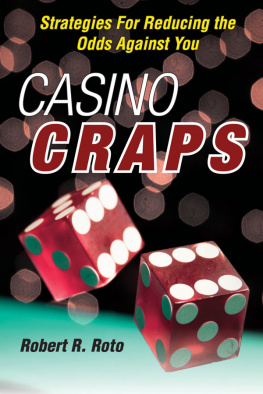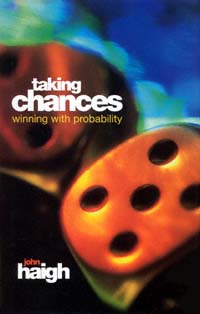Page iv
OXFORD
UNIVERSITY PRESS
Great Clarendon Street, Oxford OX2 6DP
Oxford University Press is a department of the University of Oxford and furthers the University's aim of excellence in research, scholarship, and education by publishing worldwide in
Oxford New York Athens Auckland Bangkok Bogot Buenos Aires Calcutta Cape Town Chennai Dar es Salaam Delhi Florence Hong Kong Istanbul Karachi Kuala Lumpur Madrid Melbourne Mexico City Mumbai Nairobi Paris So Paulo Singapore Taipei Tokyo Toronto Warsaw
and associated companies in Berlin Ibadan
Oxford is a registered trade mark of Oxford University Press
Published in the United States by Oxford University Press Inc., New York
John Haigh, 1999
All rights reserved. No part of this publication may be reproduced, stored in a retrieval system, or transmitted, in any form or by any means, without the prior permission in writing of Oxford University Press. Within the UK, exceptions are allowed in respect of any fair dealing for the purpose of research or private study, or criticism or review, as permitted under the Copyright, Designs and Patents Act, 1988, or in the case of reprographic reproduction in accordance with the terms of licenses issued by the Copyright Licensing Agency. Enquiries concerning reproduction outside those terms and in other countries should be sent to the Rights Department, Oxford University Press, at the address above.
This book is sold subject to the condition that it shall not, by way of trade or otherwise, be lent, re-sold, hired out, or otherwise circulated without the publisher's prior consent in any form of binding or cover other than that in which it is published and without a similar condition including this condition being imposed on the subsequent purchaser
A catalogue record for this book is available from the British Library
Library of Congress Cataloging in Publication Data
Haigh, John, Dr.
Taking chances: winning with probability/John
Haigh
Includes bibliographical references and index.
1. Probabilities-Popular works. I. Title
QA273. 15. H35 1999 519.2-dc21 98-39018
ISBN 0 19 850292 3 (Hbk)
Typeset by Footnote Graphics, Warminster, Wilts
Printed in Great Britain by Biddles Ltd, Guildford and King's Lynn
Page vii
Preface
You apply probability to almost every conscious decision you make. What you wear will depend on your assessment of the weather outlook. When you cross the road, you ensure that the chance of being struck by a vehicle is acceptably small. Your spare light bulbs are there 'just in case'. The whole of the insurance industry, be it property, possessions, life or whatever is based on judgements about the balance of risks. If humans were not naturally so good at working intuitively with many ideas of probability, modern civilization would never have evolved.
But despite their frequently good intuition, many people go wrong in two places in particular. The first is in appreciating the real differences in magnitude that arise with rare events. If a chance is expressed as 'one in a thousand' or 'one in a million', the only message registered maybe that the chance is remoteand yet one figure is a thousand times bigger than the other. Another area is in using partial information: you might be asked to guess, from looking at a photograph, whether a striking young woman is a model or an office worker. It is tempting to go for the former, forgetting that there are far more office workers than models to choose from.
Anyone who buys Lottery tickets, plays games with cards or dice, or bets on the Grand National, is aware of the operation of random chance. Even if we do not sit down to make the calculations, we have some intuition and experience that tells us what is possible, what is likely, and what is typical. These assessments are usually good enough for practical purposes, but without a sound approach to combining and interpreting probabilities, it is easy to blunder. Suppose you are a member of a jury, where the defendant is accused of a serious crime such as rape or murder. The evidence is said to be such that the chance of it arising if the defendant were innocent is one in a million. Some people might believe that this is equivalent to saying that the chance the defendant is innocent, given this evidence, is one in a million. Nonsense. That piece of logic is akin to equating 'The chance that Jean forgets her coat when it rains is 1%' with 'The chance that it rains when she forgets her coat is 1%'.
Page viii
In this book, I describe a number of common experiences in which chance plays a role. My aim is to entertain, enlighten and inform (not necessarily in that order). Some examples will be familiar, others less so, but all have some connection with probability. Each chapter has some common theme, sometimes ending with a postscript, a diversion into some probabilistic corner. Often, an idea can be communicated using some game between two or more individuals or teams. The notion that you can gain an edge in such games by being good at working with probability usually appeals to our competitive instincts.
This book is aimed at the 'layman', interpreted as someone untrained in science or mathematics, but wishing to reason probabilistically with confidence. It is said that every mathematical expression in a 'popular' book halves the readership. I could not achieve my objectives by eschewing all such expressions, but I have sought to keep symbols to the minimum in the main text. There are five appendices into which I have shamelessly drawn upon more mathematical familiarity. Not every reader will run at the sight of an x. In a number of places within the text some material is separated out into a box. These boxes are usually more mathematical than their surroundings, and can always be ignored without cost to the main story. I hope many readers will not be inhibited, and will seek to come to grips with what is written there. Some powerful ideas are surprisingly accessible, if you try.


